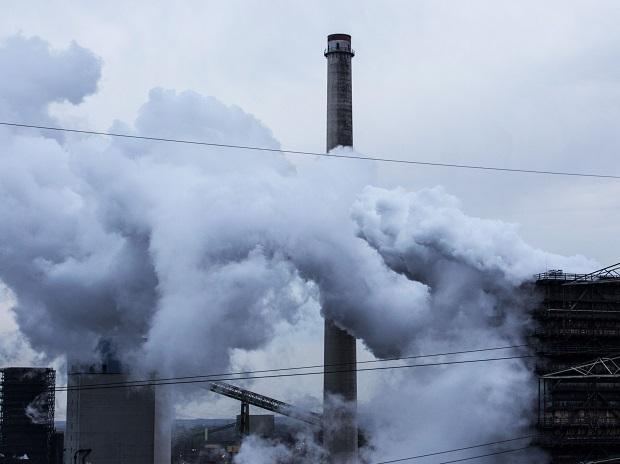An ambitious pledge to cut greenhouse-gas emissions under consideration by the U.S. gives President Joe Biden more leverage when he hosts leaders for a climate change summit later this month--presenting a particular challenge to China’s Xi Jinping.
The White House may commit to emissions cuts of 50% or more from 2005 levels by 2030, Bloomberg reported last week. Officials are looking at opportunities across the federal government on standard-setting, clean energy investments and resilient infrastructure plans, according to people familiar with the deliberations.
It’s uncertain whether the U.S. can actually deliver on such a bold plan, but the indication that Biden is willing to significantly up the ante on emissions targets may put pressure on China, which has already tried to position itself as a leader in reducing greenhouse gases.
The U.S. administration is fashioning the aggressive target as it seeks to rebuild trust with nations wary after former President Donald Trump withdrew from the Paris agreement and dismantled domestic policies key to driving the country’s promised emissions cuts.
At stake is the ability to create standards and develop equipment and technologies that will be used for decades to transition the global economy away from fossil fuels with advances in everything from renewables to electric vehicles to greener steelmaking.
“You can cancel regulation, but you can’t erase technological advances,” said Lauri Myllyvirta, lead analyst with Centre for Research on Energy and Clean Air. “Hopefully the U.S. domestic plans will be followed by ambitious programs to invest in the low-carbon transition in emerging countries.”
Tackling climate change has been an effective foreign policy tool for Xi since he became China’s president in 2013. He and former President Barack Obama worked out a bilateral emissions agreement in 2014 that helped pave the way for the 2015 Paris climate pact. When Trump’s administration left that, Xi began to assert more of a global leadership role in the area.
Xi last year announced that China would reach net-zero emissions by 2060. His policies have also led China to a world-leading role in manufacturing solar panels, wind turbines and electric vehicles.
Also hanging in the balance may be the shape of India’s energy transition. The world’s third-biggest polluter has yet to publicly commit to a pathway toward net zero emissions. During the summit, Biden is likely to press for a commitment from Prime Minister Narendra Modi, who may seek to tie a pledge to energy transition aid, according to BloombergNEF analyst Ali Izadi-Najafabadi.
Here’s a look at how other Asian countries attending the April 22-23 event may be impacted by a larger U.S. climate pledge, according to Izadi-Najafabadi:
Japan: Prime Minister Yoshihide Suga may formally announce new emissions targets. The country is planning to set a 2030 target to reduce greenhouse gas emissions by 45% compared with 2013 levels, the Mainichi newspaper reported last week, citing an unidentified government official. The country’s industry minister said those numbers weren’t accurate, Reuters reported.
Australia: The country is a laggard on climate change, and Prime Minister Scott Morrison is likely to tout his government’s support for research and development in areas such as hydrogen and carbon capture and storage.
Indonesia: President Joko Widodo’s government wants to utilize Indonesia’s rich nickel resources to build a domestic lithium-ion battery manufacturing industry, and he may seek a bilateral agreement on cooperation to deploy renewables as well as battery manufacturing capacity in Indonesia.
South Korea: President Moon Jae-In is likely to reiterate Seoul’s net-zero 2050 target and related investment plans. There may also be some announcements around increased bilateral cooperation for helping developing economies.
Vietnam: The country has experienced rapid growth in deployment of renewables -- particularly solar -- but many international manufacturers including Apple Inc. and Google have been pushing the government to make clean power procurement easier. This may be an area where Hanoi and Washington may announce something.
 Dear Reader,
Dear Reader,
Business Standard has always strived hard to provide up-to-date information and commentary on developments that are of interest to you and have wider political and economic implications for the country and the world. Your encouragement and constant feedback on how to improve our offering have only made our resolve and commitment to these ideals stronger. Even during these difficult times arising out of Covid-19, we continue to remain committed to keeping you informed and updated with credible news, authoritative views and incisive commentary on topical issues of relevance.
We, however, have a request.
As we battle the economic impact of the pandemic, we need your support even more, so that we can continue to offer you more quality content. Our subscription model has seen an encouraging response from many of you, who have subscribed to our online content. More subscription to our online content can only help us achieve the goals of offering you even better and more relevant content. We believe in free, fair and credible journalism. Your support through more subscriptions can help us practise the journalism to which we are committed.
Support quality journalism and subscribe to Business Standard.
Digital Editor

RECOMMENDED FOR YOU